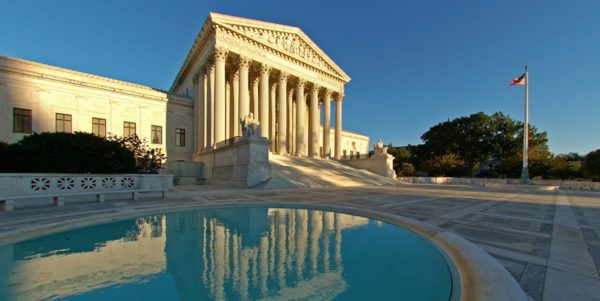Greece v. Galloway
AT ISSUE
Residents of Greece, N.Y., challenged the Town Board’s practice of having clergy (predominantly Christian) lead citizens in prayer during its municipal meetings.

BJC’S POSITION
Government cannot align itself with religion or press citizens to participate in religious exercises. Government-sponsored prayer at local government meetings violates the First Amendment’s promise of neutrality toward religion and demeans religious liberty. BJC filed a brief opposing the town’s practice of opening municipal meetings with prayer, saying the practice “infringes the liberty of conscience of not just religious minorities, but also of Christians who believe that worship should be voluntary.”
The town argued that its practice is constitutional under the Supreme Court’s Marsh v. Chambers decision (1983), but the BJC brief drew a sharp distinction. The prayer practice upheld in Marsh involved a chaplain employed by the Nebraska Legislature to minister to its members, a practice the Court found comparable to the historical tradition in Congress. The practice in Greece differs in fundamental ways. It occurs at local government meetings that involve direct citizen participation with lawmakers whose decisions will affect them.
“By opening a local government meeting with an exercise of religious devotion, a political assembly is transformed into a religious congregation,” said BJC General Counsel Holly Hollman. “It is because of – not in spite of – the importance of prayer and religion that we object to this government assumption of religious functions.”
STATUS
On May 5, 2014, a divided U.S. Supreme Court ruled that official prayers opening local municipal meetings may be constitutional, finding them consistent with the historic tradition of chaplain-led prayers before Congress and state legislatures.
While the justices were divided on the significance of particular facts, the decision did not create a new constitutional test for evaluating a prayer practice in a government forum. Instead, the Court upheld the town’s practice as consistent with the historic tradition of chaplain-led prayers before Congress and state legislatures.
Justice Elena Kagan cited BJC’s brief in her dissent. Kagan wrote that the prayer-givers in Greece “appear almost always to assume that everyone in the room is Christian (and of a kind who has no objection to government sponsored worship).” Her footnote points out that the BJC brief says “many Christians believe … that their freedom of conscience is violated when they are pressured to participate in government prayer, because such acts of worship should only be performed voluntarily.”
From the Brief
“The Court should reject petitioner’s attempt to redefine the Religion Clauses, and should instead reaffirm the Founders’ understanding that prayer is an expression of voluntary religious devotion, not the business of the government.”
“Local board meetings directly affect citizens in a way that legislative meetings do not. The issues involved are more personal: local government typically considers zoning, land development, and local budget matters, so participants often have strong personal stakes in the issues being decided. At the same time, the ‘localized nature’ of these decisions may make officials more ‘susceptible to community pressures, political influences, and personal bias.’ … Thus, when such a meeting opens with prayer, the religious dissenter is in a far different position than a passive spectator in the anonymous setting of a visitor’s gallery.”
“[W]hen municipalities unite a town meeting with communal worship, the dissenting citizen is put on the horns of a dilemma: jeopardize access to the most accessible and participatory level of government, or compromise one’s conscience by joining insincerely in prayer. But this dilemma is not limited to non-Christians; many Christians believe, as amici do, that their freedom of conscience is violated when they are pressured to participate in government prayer, because such acts of worship should only be performed voluntarily.”
“Since the meeting is participatory and communal, the prayer is not an internal matter among legislators representing distant constituents. In fact, in the Town of Greece, prayer-leaders turn their backs to the Board and face—and give instructions to—the participants. In this setting, participants who would dissent from petitioner’s worship service have no choice but to do so conspicuously. If they come to advocate for their beliefs and defend their personal interests, they must decide whether to risk showing disrespect to the Board members by refusing to participate in the communal prayer service the Board instituted.”
Featured
Resources
Full BJC brief (PDF)
Joined by the General Synod of the United Church of Christ and the Stated Clerk of the General Assembly of the Presbyterian Church (U.S.A.)
Legal and practical implications of Town of Greece v. Galloway (PDF)
By Holly Hollman (May 16, 2014)
Town of Greece: A Guided Tour of the Supreme Court’s Prayer Decision
By BJC Blogger Don Byrd
A theological response to Greece v. Galloway (PDF)
By BJC’s Charles Watson Jr.
Podcast: Greece v. Galloway
Featuring BJC’s Holly Hollman and Nan Futrell
Supreme Court examines government prayer practices (PDF)
By Holly Hollman (December 11, 2013)




